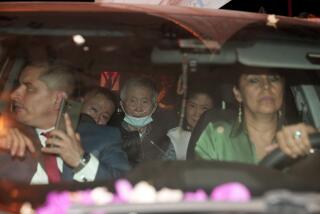Peruvian Rebels Free 7 More Hostages
- Share via
LIMA, Peru — Leftist rebels released seven more hostages from the Japanese ambassador’s residence Wednesday.
The haggard captives left the residence about 5:25 p.m., accompanied by Bishop Juan Luis Cipriani and a Red Cross official. All appeared to be Japanese or Peruvians of Japanese descent.
The latest release leaves 74 hostages inside the embassy residence.
Cipriani, who has played a role in negotiations between the rebels and the government, walked the ex-captives out of the compound.
They were taken to a nearby hospital for a medical examination.
It was the second release of hostages in two days.
Among those released were Alberto Yamamoto, president of Peru’s National Institute for Development, and Juan Assereto, an economic advisor to the government, the Red Cross said in a statement.
The hostage crisis began Dec. 17, when Tupac Amaru Revolutionary Movement rebels raided a party at the Japanese ambassador’s residence and seized more than 500 guests--most of them businessmen, diplomats, other political officials and journalists.
Almost immediately, the rebels began releasing hostages. Two were freed Tuesday.
Japanese Ambassador Morihisa Aoki, who is among the remaining hostages, took partial responsibility for the crisis.
“It was due to my lack of discretion that this kind of incident occurred,” Aoki said Tuesday in an interview with journalists allowed inside the compound.
“I feel that I must deeply apologize to the Japanese people and government,” he said.
There were hopes that the crisis would be resolved soon when rebels freed 20 hostages Saturday after their first face-to-face meeting with the government’s negotiator.
The rebels had appeared to back off of their demand that the government free about 300 jailed rebels. But Tupac Amaru leaders revived that demand Tuesday in their first meeting with journalists since the crisis began.
Police cut phone lines to the residence early in the crisis, in part to prevent the rebels from using them as a propaganda device.
President Alberto Fujimori has stood firm publicly against the Tupac Amaru, saying he would not negotiate until the rebels disarmed themselves and freed the hostages.
Japan’s Foreign Ministry said Wednesday that Uruguay’s foreign minister, Alvaro Ramos, will visit Japan this week to explain his government’s position on the crisis.
Uruguay came under international criticism because rebels released its ambassador shortly after Uruguay released two Tupac Amaru prisoners. The timing prompted speculation that Uruguay had made a deal with the rebels--something Uruguay has denied.
More to Read
Sign up for Essential California
The most important California stories and recommendations in your inbox every morning.
You may occasionally receive promotional content from the Los Angeles Times.










